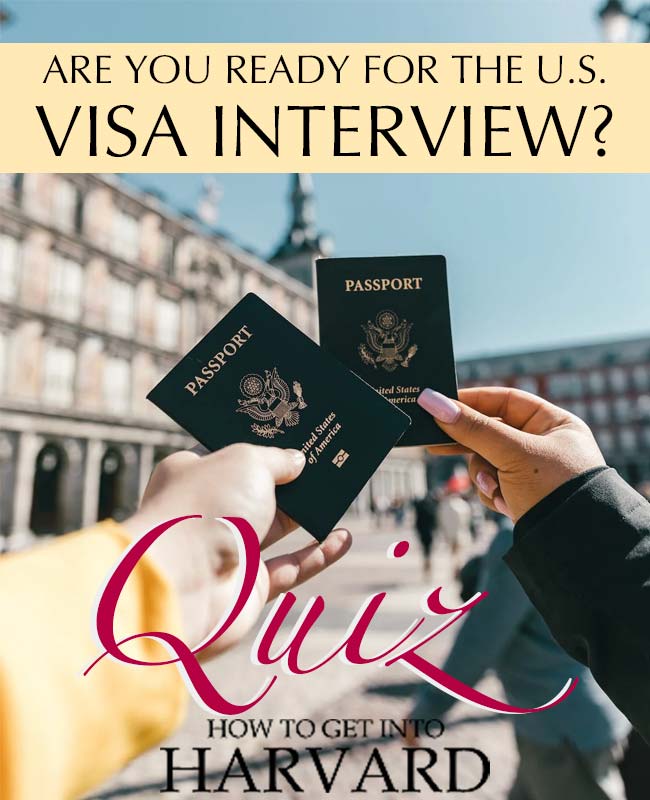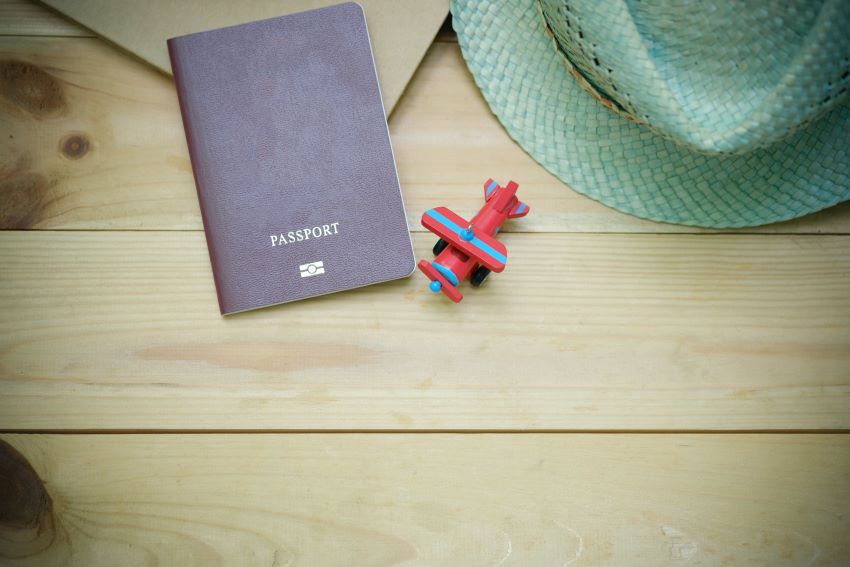Master your US visa interview with our essential guide! Dodge common mistakes and test your prep with our quiz. Ready to ace it?

In this super-connected world of ours, many of us are hopping borders in search of top-notch education. It’s more than just hitting the books; it’s about soaking up experiences and learning from different cultures. And it’s all in the hopes of making a big difference, not just for ourselves but also our communities back home.
Thanks to high quality ed and of course, the countless college movies from Hollywood, American education has remained a big dream for many, its educational institutions synonymous with innovation, diversity, and a bright future. However, before you can step into those hallowed halls, there exists a formidable gatekeeper: the U.S. student visa interview. Intimidating many a young mind!
How to Prepare for the US Visa Interview
Preparing for a U.S. student visa interview is crucial, as it’s THE essential first step to studying in the U.S. (after you got your admission, that is!). And if you know anything about how people get rejected left, right and center (and then cannot reapply for a few days, or what is it?), you’ll know it’s no easy feat too! But it’s not too difficult if you are well prepared either!
Don;t worry, I totes got you! I’ve afterall, helped prepare a couple of my friends too, and I of course, got mine in the first try, (not to brag, but the first thing the interviewer told me was a big, “I always wanted to go to Harvard!” and then got a big smile from me!).
So here’s a step-by-step guide on how to prepare for the interview:
Understand the Type of Visa: For students, the most common visa type is the F-1 visa. However, there are also M-1 visas for vocational students. Make sure you know which visa type you’re applying for.
Complete the Required Forms and Payments:
- DS-160: Complete the Online Nonimmigrant Visa Application. After completing the form, you’ll receive a confirmation page with a barcode. Print this out and bring it to your interview.
- SEVIS Fee: Before your visa interview, pay the SEVIS I-901 fee. You’ll need your SEVIS ID (from your I-20 or DS-2019 form) to do this.
- Visa Application Fee: Pay the non-refundable visa application fee.
Schedule Your Interview:
Once you’ve completed the forms and payments, schedule your visa interview at the nearest U.S. embassy or consulate.
Gather Required Documents:
- Passport valid for at least six months beyond your period of stay in the U.S.
- DS-160 confirmation page
- Application fee payment receipt
- Photo (some embassies may require this, so check beforehand)
- Form I-20 (Certificate of Eligibility for Nonimmigrant Student Status) or DS-2019 for J-1 applicants, signed by you and a school official
- Transcripts, diplomas, and other documents from schools you attended
- Standardized test scores required by your U.S. school
- Proof of your intent to depart the U.S. after your studies
- Financial evidence showing you have sufficient funds to cover your tuition and living expenses
Prepare for Interview Questions: Be ready to answer questions such as:
- Why do you want to study in the U.S.?
- How did you choose your school?
- What are your post-graduation plans?
- How will you fund your education?
- Do you have relatives in the U.S.?
- What ties do you have to your home country that will ensure you return after studying?
Dress Appropriately
While there’s no official dress code, dressing professionally can create a good impression.
Arrive Early
Make sure to arrive at the U.S. embassy or consulate with plenty of time to spare. This will give you time to go through security and any other preliminary steps.
Be Honest and Concise
Answer all questions honestly and to the point. Avoid offering unsolicited information.
Stay Calm
Interviews can be nerve-wracking but remember to breathe and answer questions calmly and confidently. Chances are that you may need to wait a lot before the interview, prepare for it mentally.
After the Interview
The consular officer will let you know if your visa application is approved or denied at the end of your interview. If approved, you might be asked to pay a visa issuance fee, and you’ll be informed how your passport with visa will be returned to you.
Basically, what you REALLY need to be prepared for is that you need to let the visa interviewer know that you are a legitimate student and that you have the means and intention to return to your home country after your studies. So tailor your preparation towards addressing these concerns properly.

Where Applicants Go Wrong – Why is the US Visa Usually Declined?
Many prospective students encounter issues during their U.S. student visa interviews. In fact, one applicant’s visa was denied right in front of me during my own interview – way to intimidate other applicants in the room!
Anyway, so here are some common mistakes that people make in US visa interview, and tips on how to avoid them:
Being Unprepared
Not being familiar with the details of your program or not having the necessary documents on hand can be a major setback.
Tip: Thoroughly review your application, your course of study, and gather all required documents in advance.
Not Demonstrating Strong Ties to Home Country
The interviewer needs to be convinced that you will return home after your studies.
Tip: Be prepared to discuss your plans post-graduation and any familial, professional, or financial ties to your home country.
Insufficient Proof of Financial Support
Failing to prove that you can financially support yourself can result in visa denial.
Tip: Bring clear evidence of your financial situation and how you plan to fund your education, including bank statements, affidavits of support, or scholarship offers.
Being Overly Nervous
While it’s natural to be nervous, appearing too anxious can come off as being untruthful or hiding something.
Tip: Practice your answers to potential questions and take deep breaths if you start to feel overwhelmed.
Giving Long, Unfocused Answers
Being verbose or providing unnecessary details can confuse the interviewer or come off as rehearsed.
Tip: Answer questions directly and concisely. Stick to the point.
Inconsistent Information
Giving answers that contradict information on your application or other answers during the interview.
Tip: Be familiar with all the information you’ve provided in your application and other forms.
Failing to Understand the Purpose of the Visa
If you seem unsure about your course of study or why you’re choosing the U.S. over other countries, it can raise doubts.
Tip: Clearly articulate why you wish to study in the U.S. and how it aligns with your future goals.
Not Asking Questions When Unsure
Sometimes applicants might not fully understand a question but answer it anyway, leading to miscommunication.
Tip: If you don’t understand a question, politely ask the interviewer to rephrase or clarify.
Being Dishonest
Any form of dishonesty, including fake documents or false statements, will likely lead to an immediate visa denial and may have long-term consequences.
Tip: Always be truthful. If you don’t know the answer to a question, it’s okay to say so.
Assuming Visa Approval
Don’t make final travel plans or significant financial commitments (like purchasing non-refundable tickets) until you have your visa approved.
Tip: Wait for the official confirmation of your visa approval before making irreversible plans.
Not Checking the Embassy’s Specific Requirements
While there are standard procedures and documents required across U.S. embassies, some might have specific requirements or processes.
Tip: Check the official website of the U.S. embassy or consulate where you’re interviewing for any specific guidelines or updates.
Are You Ready for the US Visa Interview Quiz
To the uninitiated, the visa interview can appear as just another administrative hurdle, but ask any international student, and they’ll tell you it is more than just ticking boxes on a checklist. It’s a conversation where one’s aspirations, ties to their homeland, and visions for the future are examined and evaluated. Laid bare really! Where your sincerity is just as important as the authenticity of your documents.
I recall conversations with other Harvard students from Pakistan to the Philippines, each had a unique story, but a common thread wove through – the mixture of anxiety and anticipation leading up to the interview.
And so here comes the inevitable question – how does one truly prepare for such a moment? Is it enough to simply know the intricacies of your application, or is there a deeper level of introspection that you need?
So I’m here to calm your nerves with my ULTIMATE Are You Ready for the U.S. Visa Interview? quiz. Far from being a mere Buzzfeedy entertainment tool, this quiz will show you not only your preparedness in terms of documentation and procedure but also your mental and emotional readiness too. Aaah, are you ready?
While no quiz can fully gauge the complexity of the US Visa interview, hopefully this quiz and guide will be your starting point (or ending point, if you ace it!).
So whether you’re taking your first steps or are on the verge of boarding that flight, remember: higher ed is not just about crossing borders, but expanding your horizons. So keep your confidence and clarity. The dream awaits.
Loading...
Correct!
Wrong!
Correct!
Wrong!
Correct!
Wrong!
Correct!
Wrong!
Correct!
Wrong!
Correct!
Wrong!
Correct!
Wrong!
Correct!
Wrong!
Correct!
Wrong!
Share the quiz to show your results !
Subscribe to see your results
%%personality%%
%%personality%%